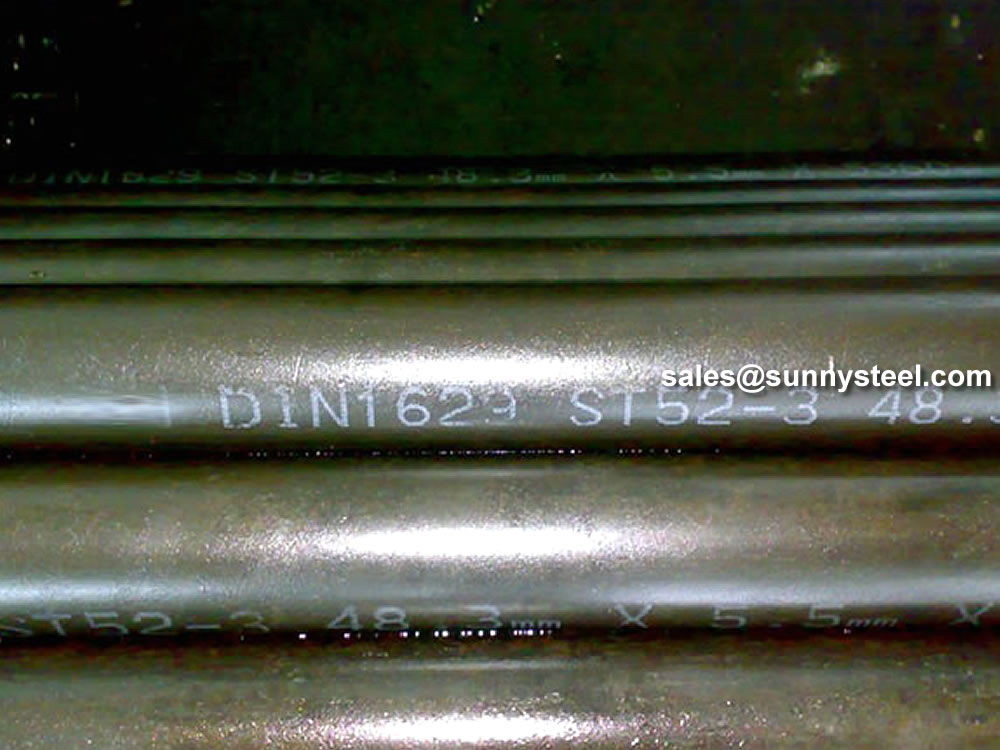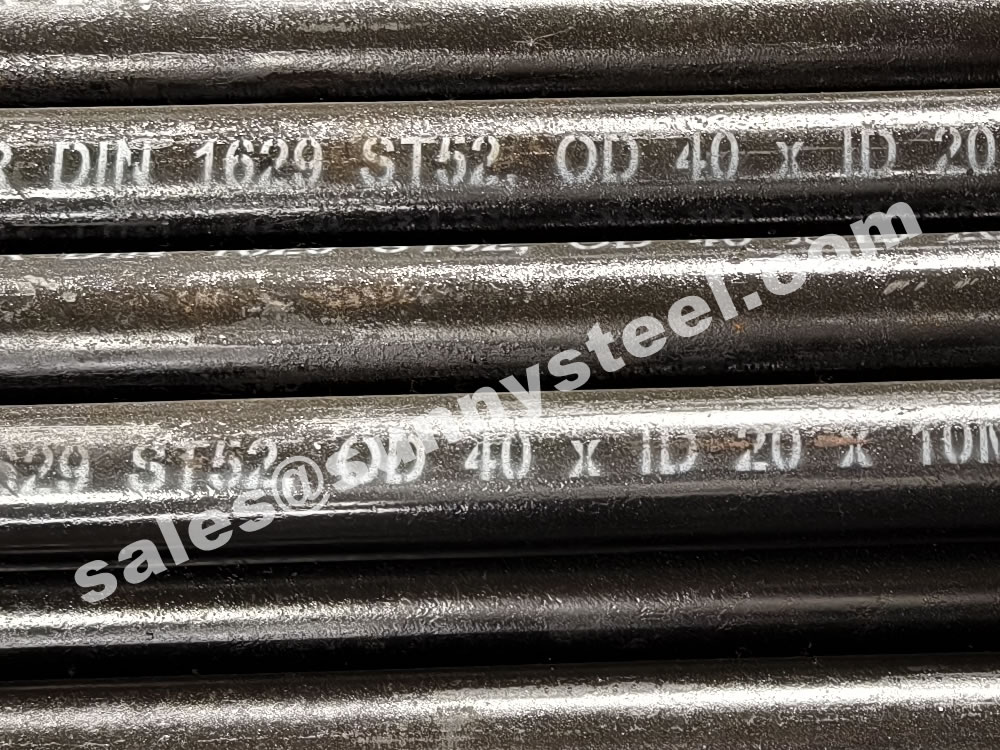
DIN 1629 Seamless Steel pipe Of Non Alloys Steels are made of unalloyed steels, it's main grades are St 37.0, St44.0, St52.0.
DIN 1629 is a German standard that specifies the requirements for seamless circular steel tubes of non-alloy steels. These tubes are primarily used for mechanical and general engineering purposes, but they are not suitable for heat treatment or pressure purposes. The key points about DIN 1629 include:
DIN 1629 is the standard specifies the Seamless Circular Tubes of Non Alloys Steels with Special Quality Requirements.
DIN 1629 applications the overheated boilers, as minimum thickness ferrite and seamless steel pipes, and as heat exchangers via austenitic pipes.
The standard specifies the outer diameter, wall thickness, and permissible tolerances for the tubes.
The mechanical properties include tensile strength, yield strength, and elongation, which vary according to the material grade.
The steel used must meet specific chemical composition limits, including carbon, manganese, phosphorus, and sulfur content.
Tubes must be manufactured using a seamless process and may be either hot-finished or cold-finished.
Various tests are required to ensure the quality of the tubes, including tensile tests, flattening tests, and hardness tests.


1.1 This standard applies to seamless circular tubes and pipes(hereinafter briefly referred to as "tubes") made of unalloyed steels as listed in table 1. These tubes are predominantly used in the constructin of chemical plant, vessels, pipework and for general mechanical engineering purposes. They are designed to meet high performance requirements. Normally there are no limiting vaiues or the maximum permissible working pressure of these tubes. The permissi l working temperature shall not exceed 300℃ are specified in Appendix A.)
The limits of application and other specifications given in this standard shall apply except in cases here other specifications are contained in codes of practice for specific fields of application, e.g. the Technische Regeln fur Dampfkessel (TRD) (Technical rules on steam boilers) or the Technische Regeln fur Druckbehalter (TRB)
(Technical rules on pressure vessels), AD-Merkblatter (AD Instrucation sheets).
| steel grade | Type of deoxidization (R, killed (including semi-killed)) (RR, fully killed) |
chemical composition, % by mass |
|||||
|---|---|---|---|---|---|---|---|
| Symbol | Material number | C | P | S | N¹) | Addition of nitrogen fixing elements (e.g.not less than 0,020% AItotal |
|
| St37.0 | 1.0254 | R | 0.17 | 0.040 | 0.040 | 0.009²) | - |
| St44.0 | 1.0255 | R | 0.21 | 0.040 | 0.040 | 0.009²) | - |
| St52.0³) | 1.0421 | RR | 0.22 | 0.040 | 0.035 | - | Yes |
1) A content in excess of the maximum value started is permitted if a phosphorus content less than the maximum specifled by 0,005% P per 0,001% N is observed. However, the nitrogen content shall not exceed a value of 0.012% in the cast analysis and 0,014% in the product analysis.
2) The specified maximum values do not apply if the steels are supplied with the RR (instead of R) type of deoxidization
3) The content shall not exceed 0.55% Si and 1,06% Mn in the cast analysis or 0,60% Si and 1,70% Mn in the product analysis
table 3. Amounts by which the chemical composition in the product analysis may deviate from the limiting values applicable to the cast analysis {see table2}
| Element | Amount by which the product analysis may deviate from the limiting values applicable to the analysis % by mass |
|---|---|
| C | +0,02 |
| P | +0,010 |
| S | +0,010 |
| N | +0,001¹) |
¹) A contant in excess of the maximum value stated is permitted if a phosphorus content less than the maximum specified by 0,005% P per 0,001% N is observed. However, the nitrogen contant shall not exceed a value of 0,012% in the cast analysis and 0,014% in the product analysis (this does not apply to the RR type of deoxidization.
table 4. Mechanical properties of tubes in the as delivered condition at room ternperature For wall thickness exceeding 65 mm, the values shall be agreed at the time of ordering
| Steel grade | Upper yield stress ReH for wall thicknesses, in mm, |
Tensile strangth Rm N/mm² |
Elongation after fracture A5 |
||||
|---|---|---|---|---|---|---|---|
| Symbol | Material number |
up to 16 | over 16 up to 40 |
over 40 up to 65 |
lonigtudinal | transverse | |
| St 37.0 | 1.0254 | 235 | 225 | 216 | 350²) to 480 | 25 | 23 |
| St 44.0 | 1.0256 | 275¹) | 265¹) | 255¹) | 420²) to 550 | 21 | 19 |
| St 52.0 | 1.0421 | 355 | 345 | 335 | 500²) to 650 | 21 | 19 |
| Grade | C max | Si max | Mn | P max | S max |
|---|---|---|---|---|---|
| St 35 | 0.17 | 0.35 | ≥0.40 | 0.025 | 0.025 |
| St 45 | 0.21 | 0.35 | ≥0.40 | 0.025 | 0.025 |
| St 52 | 0.22 | 0.55 | ≤1.60 | 0.025 | 0.025 |
| Steel grade | BK | BKW | BKS | GBK | NBK | |||||||
| Yield strength Rm N/mm min | Elongation% min | Yield strength Rm N/mm min | Elongation % min | Yield strength Rm N/mm min | Tensile Strength ReH N/mm min | Elongation % min | Yield strength Rm N/mm min | Elongation % min | Yield strength Rm N/mm min | Tensile Strength ReH N/mm min | Tensile Strength ReH N/mm min | |
| St35 | 480 | 6 | 420 | 10 | 420 | 315 | 14 | 315 | 25 | 340-470 | 235 | 25 |
| St45 | 580 | 5 | 520 | 8 | 520 | 375 | 12 | 390 | 21 | 440-570 | 255 | 21 |
| St52 | 640 | 4 | 580 | 7 | 580 | 420 | 10 | 490 | 22 | 490-630 | 355 | 22 |
¹) For cold f inished tube in the NBK condition (annealed above the upper transformation point under shielding gas or in a vacuum), minimum values of yield stress lower than these valued by 20N/mm² are permitted.
²) For cold finished tubes in the NBK condition, minimum values of tensile strength lower than these values by 10N/mm² are permitted.
Din 1629 seamless steel pipes application fields are: chemical plant, vessels, pipework construction and for common mechanical engineering purposes. Normally DIN 1629 standard are manufactured with no limiting working pressure values. Working temperature is limited below 300℃.